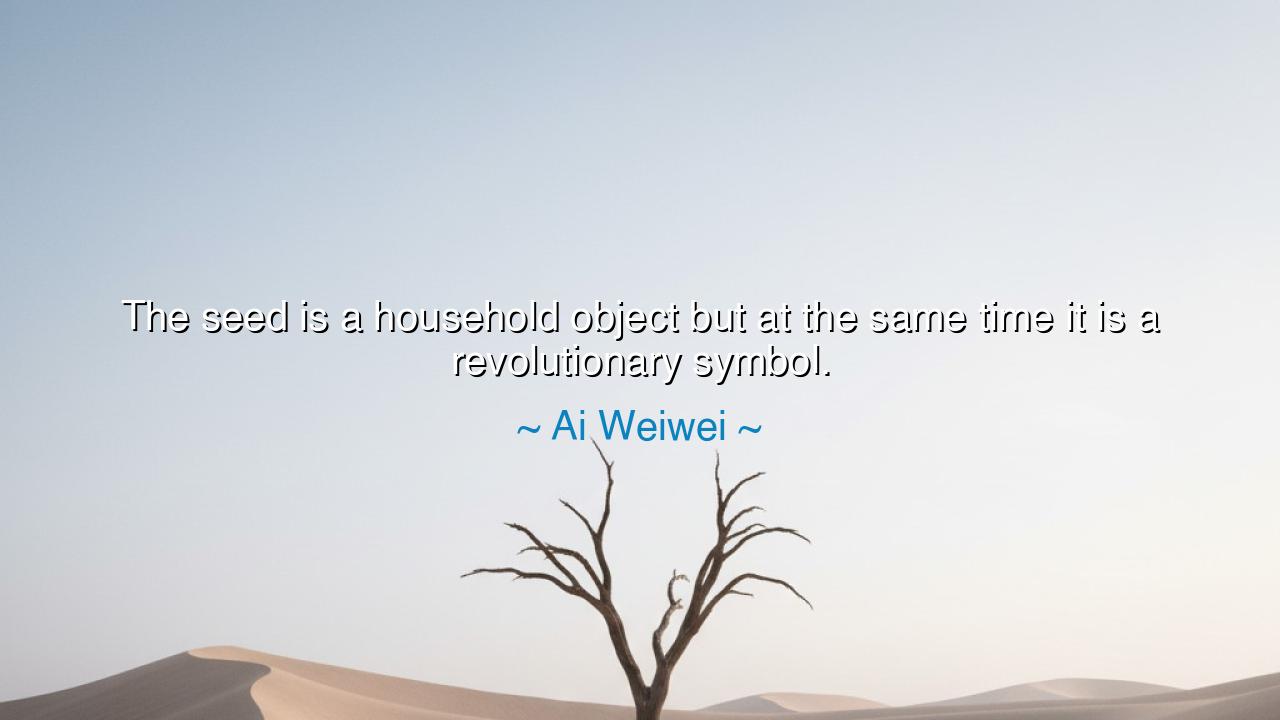
The seed is a household object but at the same time it is a






Hear, O children of earth and memory, the words of Ai Weiwei, who proclaimed: “The seed is a household object but at the same time it is a revolutionary symbol.” At first, these words appear plain, like the seed itself—small, ordinary, overlooked. Yet in them lies a truth that shakes both house and empire. The seed, humble and silent, is more than food or grain; it is potential incarnate, a promise of life that defies the present. It dwells in kitchens and in fields, but it also dwells in the hearts of those who long for change.
The seed is indeed a household object, for every home depends on it. It is ground into bread, boiled into rice, sown in gardens to sustain life. It connects us to our ancestors who sowed and reaped before us, and to our children who will do the same. Yet, as Ai Weiwei reminds us, this common thing carries also the weight of revolution. For from a single seed, forests rise, nations are fed, and people are sustained in their resistance against hunger, poverty, and oppression.
In history, seeds have indeed been weapons of transformation. Think of Gandhi and the Salt March. Though not a seed of the earth, the salt crystal, like the seed, was a simple household object elevated into a symbol of resistance. Gandhi showed that even the humblest necessity, when imbued with courage, can overthrow empires. Likewise, in many revolutions, seeds have been the quiet strength of the people—the hidden grain that sustained armies, the secret harvests that fed rebels, the small beginning that blossomed into freedom.
Ai Weiwei himself once created an artwork of millions of hand-painted porcelain sunflower seeds, each crafted by villagers in Jingdezhen, China. Individually, they were fragile, almost meaningless. Yet together, spread across a vast floor, they became overwhelming, a sea of resilience. In this, Weiwei showed that the seed is not only about nourishment, but about collective power. A seed in one hand is a meal; a million seeds in many hands is a revolution.
The deeper wisdom of the quote is this: the seed embodies contradiction. It is ordinary, yet extraordinary. It is fragile, yet enduring. It is silent, yet filled with explosive potential. So too are people, especially the common folk, often dismissed as small and powerless. But within each person lies the possibility of growth, of transformation, of revolution. Just as a seed carries within it a tree, so too does every individual carry the power to change the course of history.
The lesson for us is clear: never despise what is small, humble, or hidden. The seed teaches patience and faith, for it must be buried in darkness before it can rise into light. So too must ideas and movements often begin quietly, unnoticed, before they break through into the world. To cherish seeds is to cherish beginnings; to protect them is to protect the future.
Practically, this means nurturing the small things—an idea, a friendship, a cause—that may seem insignificant today but hold the power to reshape tomorrow. Plant seeds of kindness, of justice, of truth in the soil of your daily life, and guard them against neglect. When they grow, they will feed not only you, but generations. Support those whose voices seem small, for they may be the seeds of great change.
So, O listeners, remember Ai Weiwei’s truth: the seed is a household object, but at the same time it is a revolutionary symbol. In your home it may feed your body, but in your heart it must feed your hope. Treat it not as something trivial, but as a reminder that all change begins small. Carry seeds within you—not only of grain, but of courage and imagination—and scatter them generously. For from them shall rise forests of freedom, harvests of justice, and revolutions of the soul.
––






AAdministratorAdministrator
Welcome, honored guests. Please leave a comment, we will respond soon